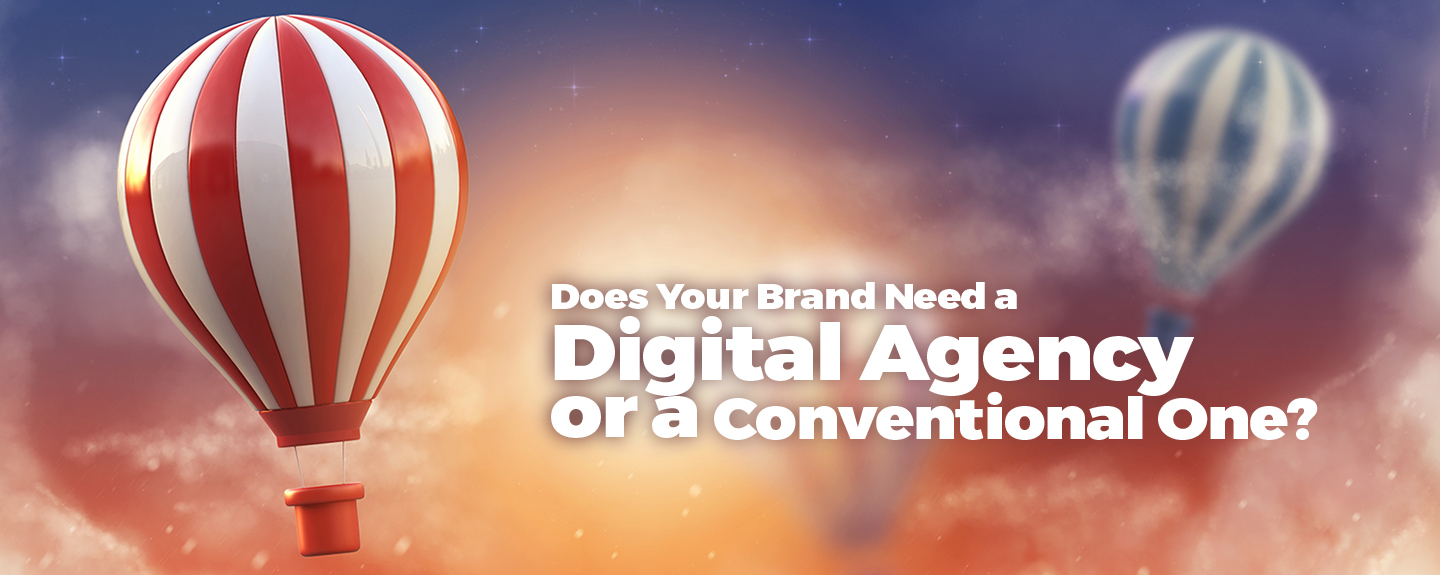Whichever business you are in, you need to advertise, but today, your brand also needs to have a presence in the digital and social space as well.
While most agencies nowadays offer digital and social solutions, this is not an area that they are fully competent in. On the other hand, agencies that specialize in digital do not offer mainline capabilities. In fact, going by their work, it seems they do not understand the rudiments of branding. You would have noticed any number of viral videos that are popular for a while, but you don’t get to hear anything from the brand after that. Most of the digital agencies don’t do consistently good work; the noticeable stuff they do is generally a flash in the pan.
As Maslow said, “If the hammer is the only tool you have, you will see every problem as a nail.” This is so true for the advertising industry. For the same marketing problem, a specialist agency will offer only solutions in what they specialize in. So it’s unrealistic to expect your agency to offer you solutions that fall outside of their set of competencies. If you are the client, chances are you will need two agencies – one for traditional, and the other for digital. But this may not last for very long. The only reason digital agencies exist is that the practice is new. For instance, there are no agencies that specialize in, say, print or radio.
Long ago, when television advertising was new in the US, initially there were creative people who specialized in TV commercials, while others focused only on print. Today the idea seems silly, and these are not seen as two separate sets of competencies.
Point is, sooner than later, agencies will have to evolve to bring all the offerings under one roof. Digital Advertising is integral to brand communications, and they wouldn’t have the luxury of not taking it on.
The best of agencies are already doing this. Alex Bogusky, formerly of Crispin Porter Bogusky, said in an interview that in his agency, the people who work on a brand develop all communication solutions, including digital. Perhaps that’s the reason the agency has done cutting edge work like Subservient Chicken and Whopper Sacrifice.
Recently our campaign for Compare Munafa.com made good use of outdoor, digital, print and social, and the brand communication spoke in one voice, leveraging the strength of each medium.
Not having expertise in digital will prevent an agency from developing holistic solutions.
Today, at least in India, digital is not the lead medium. But things are changing. As it has already happened abroad, soon digital spent will overtake television and print spent. Who knows one-day traditional media might play a supporting role to digital.
Read- Building A Brand Without Advertising by Sabu Paul
So if you are a client what is the right thing to do? Who is your target group – is it those who consume more of digital media? For instance, if your brand is a washing soap, it makes little sense to do a huge digital campaign. Find out where your needs lie, judge the agency’s capabilities and make an informed decision. Better still choose an agency that is hybrid in nature. There are a few, and you will find them if you look around. That way, you wouldn’t have to walk the tightrope, balancing two agencies. And the integrated solutions your agency comes up with will have both traditional and digital/social components, ensuring that the whole is bigger than the sum of the parts.
1. Does scam really help the industry? let us examine the pros and cons.
Practitioners of scam have defended what they do by comparing award-winning work to haute couture and the regular work as the pret range. Haute Couture is not exactly street wear, and mostly meant only for fashion shows. However it does have an influence on what fashion labels stock; likewise award-winning ads, despite being scam, push the envelope on creative excellence. An ideal scam ad is one that makes one say, “So what if it’s scam? It’s bloody brilliant!”
Defenders of scam also say, with some justification, that those who protest the most about scam ads people who do boring ads and who wouldn’t win even if they are allowed to scam.
2. Now, let’s look at the negative effects of scam.
Today, in most agencies, the sole focus of junior creative talent is awards. Sadly, in the process, regular work has taken a backseat. The reason you don’t find too many good ads, particularly print ads, is this.
Paraphrasing the adage ‘It’s not creative unless it sells’ one could say ‘It is not an ad if it hasn’t run’. One of the challenges of executing a great ad is selling it to the client. Take that out of the equation, and is it advertising anymore?
Further,released work, which will never be as edgy as scam, goes uncelebrated. A released ad, however brilliant, has little chance of winning against scam.
Agencies spend huge amounts of money to create scam ads and enter them for awards. Wouldn’t this money be better spent on, say, training or even remunerating people better?
So on balance, what should the industry’s stand on scam ads? Maybe it’s time for agencies to introspect, and take a stand. While scam ads are here to stay – it’d be extremely difficult to enforce a ban on them – it’s worth our while to reflect whether we should take advertising awards all that seriously.
5. Trust your intuition
A long-term relationship is built on mutual respect, trust and understanding. Is the team passionate? Inspiring? Are they collaborative and proactive? Are they willing to listen?
While there’s no way one can measure all this with 100% certainty in a few meetings, you will pick up signs during close interactions. Visit their office and you will get an idea of their work culture. Chat with the employees, and get a feel of their work culture. Does the workplace
radiate cheerfulness and energy, or does it feel like a dead place? Do you share a comfort level with them?
You don’t need a checklist for all this; you would instinctively know. Now a few points on how to get the best from your agency once you appoint them.
Decide and let the agency know who would be the approving authority. Don’t let a committee take decisions, particularly when it comes to creative calls. As somebody once said, a camel is a horse designed by a committee. Most of the iconic advertisement campaigns have one thing in common: they were approved by a single person, not a group of people. So keep the chain of command short. And let the agency know when their work has brought you good
results. Be transparent and honest when you deal with them. Also, don’t try to do their job
yourself. Remember that they are specialists who know their job better than you. As David Ogilvy once said, “Don’t hire a dog, then bark yourself.”
Make them your partner, and the relationship will reward you in spades.







